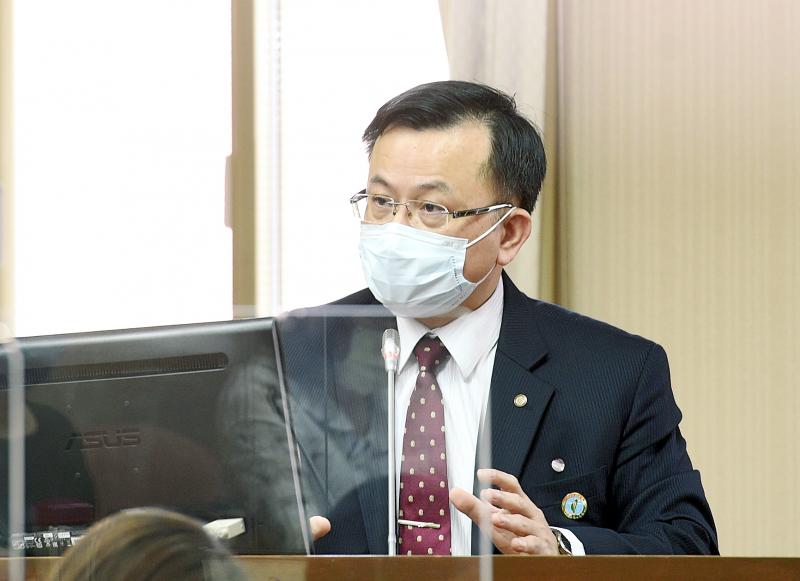People in Taiwan can access 5G services at relatively cheap rates compared with other advanced countries, National Communications Commission (NCC) Chairman Chen Yaw-shyang (陳耀祥) yesterday told lawmakers at a meeting of the legislature’s Transportation Committee.
Although Chen was there to brief lawmakers about the commission’s budget plan for the next fiscal year, they asked him mostly about his meeting with telecom executives on Thursday last week, where he was expected to convey legislators’ expectations that telecoms would boost the 5G penetration rate nationwide by lowering monthly fees.
Four of Taiwan’s five large telecoms charge NT$1,399 per month for an unlimited data plan, while Taiwan Star charges NT$999 per month, Chen said, adding that a variety of data plans are available.

Photo: Peter Lo, Taipei Times
Taiwan does not have significant market players in 4G or 5G markets, and as such telecoms can sell these plans without having to secure NCC approval for the rates, Chen said.
“When one takes into account people’s buying power and other factors, Taiwan’s 5G service rates might not be the lowest, but they are relatively cheap when compared with other advanced countries,” he said, adding that the commission would continue to urge telecoms to offer more promotional plans so that more people would be motivated to migrate from 4G to 5G.
One of the telecom executives at last week’s meeting, who preferred to stay anonymous, said that an unlimited data plan in a 5G system costs NT$2,225 per month in South Korea, NT$1,729 in Japan and NT$1,959 in the US.
South Korea’s 5G penetration rate is about 25 percent after the services were launched two years ago, whereas Taiwan’s 5G penetration rate reached 13 percent last month after services were launched in June last year, she said.
Although the cost of building a 5G system in Taiwan is about three to four times higher than that for a 4G system, subscribers are paying NT$1,399 per month, the same as for 4G services when they were launched in 2014, she said.
However, 5G subscribers are given more minutes for extranet phone calls and more subsidies for 5G smartphone purchases, she said, adding that people in Taiwan pay a fair price for top-rated 5G services.
Meanwhile, Taiwan People’s Party Legislator Andy Chiu (邱臣遠) yesterday accused the NCC of wasting nearly NT$7 million to create a Facebook page that has generated very few views.
The NCC last year recruited a public relations firm to launch an educational campaign on Facebook regarding the safety of electromagnetic waves, Chiu said.
Instead of posting content created by the commission itself, the NCC’s Facebook page merely reposted 50 articles from the Internet, and some of the articles were not even “liked” by any viewers, Chiu said.
Chen defended the spending for the awareness campaign, saying that people are debating the safety of electromagnetic waves.
Social media is a good place to share accurate information regarding electromagnetic waves, he said, although he added that content published on the page does have room for improvement.
The public relations firm also hosted 20 meetings in various localities as part of the campaign, he said.

The Grand Hotel Taipei on Saturday confirmed that its information system had been illegally accessed and expressed its deepest apologies for the concern it has caused its customers, adding that the issue is being investigated by the Ministry of Justice Investigation Bureau. The hotel said that on Tuesday last week, it had discovered an external illegal intrusion into its information system. An initial digital forensic investigation confirmed that parts of the system had been accessed, it said, adding that the possibility that some customer data were stolen and leaked could not be ruled out. The actual scope and content of the affected data

‘LIKE-MINDED PARTNER’: Tako van Popta said it would be inappropriate to delay signing the deal with Taiwan because of China, adding he would promote the issue Canadian senators have stressed Taiwan’s importance for international trade and expressed enthusiasm for ensuring the Taiwan-Canada trade cooperation framework agreement is implemented this year. Representative to Canada Harry Tseng (曾厚仁) in an interview with the Central News Agency (CNA) said he was increasingly uneasy about Ottawa’s delays in signing the agreement, especially as Ottawa has warmed toward Beijing. There are “no negotiations left. Not only [is it] initialed, we have three versions of the text ready: English, French and Mandarin,” Tseng said. “That tells you how close we are to the final signature.” Tseng said that he hoped Canadian Prime Minister Mark Carney

President William Lai (賴清德) yesterday bestowed one of Taiwan’s highest honors on Saint Vincent and the Grenadines (SVG) Ambassador Andrea Clare Bowman in recognition of her contributions to bilateral ties. “By conferring the Order of Brilliant Star with Grand Cordon on Ambassador Bowman today, I want to sincerely thank her, on behalf of the Taiwanese people, for her outstanding contribution to deepening diplomatic ties between Taiwan and SVG,” Lai said at a ceremony held at the Presidential Office in Taipei. He noted that Bowman became SVG’s first ambassador to Taiwan in 2019 and

A man walks past elementary school artworks at the Taipei Lantern Festival in Ximen District yesterday, the first day of the event. The festival is to run from 5pm to 10pm through March 15.